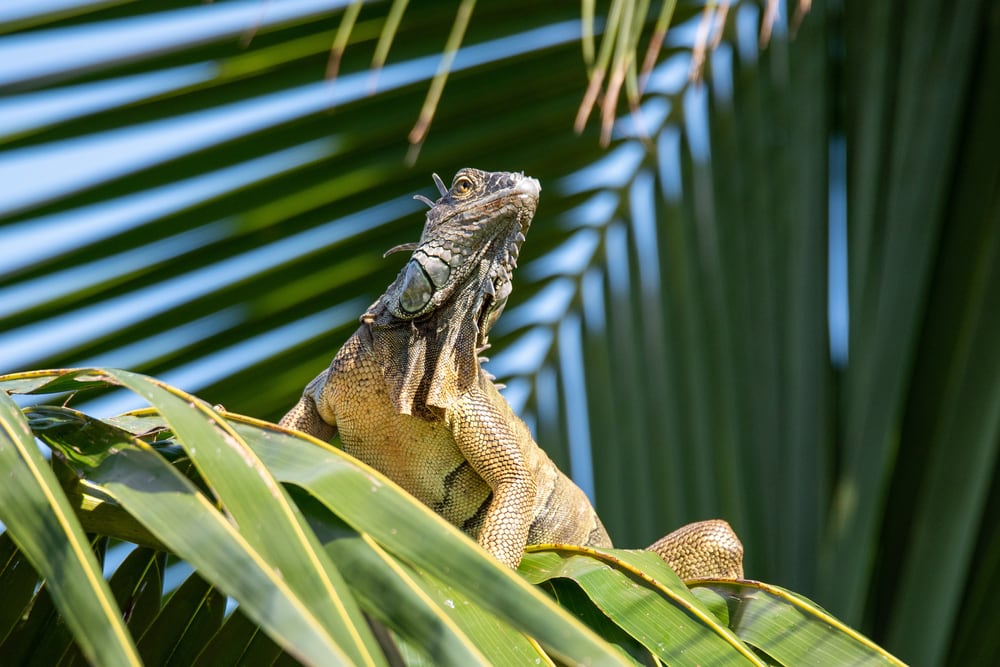Iguanas, often visualized basking in the sun or climbing trees, have a lesser-known side to their lives that involves water. While there are different types of iguanas, all iguanas can swim and are considered strong swimmers. They are typically not fast in the water, averaging speeds of around 1.5 feet per second, similar to a human’s swimming speed.
In terms of their underwater capabilities, iguanas can hold their breath for extended periods. Some species can stay submerged for up to 45 minutes, using this skill to evade predators. For instance, marine iguanas of the Galapagos Islands can remain underwater even longer while foraging for algae.
That said, it’s crucial to maintain warm water temperatures for iguanas when in captivity to prevent any risk of drowning or illness. Water temperatures around 83-85 Fahrenheit are ideal for their swimming sessions. For more specific insights and details about iguanas’ interaction with water, read the full article.
Iguanas’ Relationship with Water
Iguanas have intriguing interactions with water, showcasing both their swimming abilities and their needs related to breathing and submersion. Understanding these aspects is crucial for anyone interested in these reptiles.
Swimming Abilities
Iguanas are naturally strong swimmers, although their speed in the water is relatively slow compared to their quick land movements. They typically swim at speeds of about 1.5 feet per second, which is similar to a human’s average swimming speed.
Green iguanas, in particular, often utilize nearby lakes and rivers to help regulate their body temperature. This animal behavior developed in order to escape predators or search for food. When swimming, iguanas use a combination of body undulation and tail propulsion. Their tails act as powerful rudders, aiding them in maneuvering through water.
While swimming can offer various benefits, cold water can be dangerous for iguanas. They do best in water temperatures around 83-85°F. Exposure to water that’s too cold may risk their health, potentially leading to drowning or illness.
Breathing and Submersion
Unlike some aquatic animals, iguanas cannot breathe underwater. They must come up for air and rely on holding their breath while submerged. Typically, an iguana can hold its breath for about 30 minutes, although stress or other factors might influence this duration.
Iguanas’ ability to stay submerged for extended periods supports them in environments requiring them to escape predators or explore underwater terrains. Nevertheless, they need access to air as prolonged submersion can lead to drowning risks, especially in cooler temperatures.
There’s a definitive need for a proper balance between air and water exposure to maintain their health. Regular intervals of surfacing are essential for their well-being. It’s important for pet owners to ensure that any water bodies iguanas have access to are safe and comfortably within their temperature tolerance.
The Risks and Challenges of Iguanas
Iguanas, while fascinating creatures, can pose several risks and challenges. In truth, iguanas may be dangerous. Their potential to become invasive pests, the fact that they leave droppings, and the diseases they can carry that affect both humans and other animals make this so.
Invasiveness and Pests
In some regions, such as Florida, iguanas are invasive species and problematic pests. Their rapid reproduction and adaptability to local environments help them proliferate quickly. These reptiles damage landscapes by eating vegetation and burrowing, which can lead to erosion and property damage.
Gardeners and homeowners may find their plants destroyed by iguanas, which prefer fruits, flowers, and young leaves. Furthermore, iguanas often dig burrows that can undermine the structural integrity of sidewalks, seawalls, and foundations, leading to costly repairs.
Diseases and Health Risks
Iguanas carry several diseases that can be transmitted to humans and pets. One of the most significant concerns is Salmonella, a bacterium that can cause severe gastrointestinal distress. People can contract Salmonella through direct contact with iguanas or their droppings.
Additionally, iguanas can harbor parasites like ticks and mites, which may also transmit diseases. Beyond Salmonella, other pathogenic threats include bacteria such as Campylobacter. Handling or cleaning up after iguanas requires careful hygiene practices to minimize these health risks.
Human-Iguana Interactions
Iguanas and humans often cross paths, especially in suburban and urban areas where iguanas may seek food or shelter. This has led to various practices geared towards managing these interactions effectively.

Iguana Removal Practices
In areas with high iguana populations, iguana removal services have become essential. If you spot iguanas on your Florida property, it’s crucial to take immediate action by contacting Iguana Control. Our services employ humane trapping and relocation techniques to reduce the impact of iguanas on residential and commercial properties. Specialists typically use baited traps to capture iguanas without causing harm.
Professional iguana removal includes inspecting the property to identify entry points and food sources. Preventative measures, like installing barriers and removing attractants, are crucial. Some services also offer repair of damages caused by iguanas, such as burrowed foundations or nibbled vegetation.
Understanding iguana behavior is critical for effective removal. Iguanas are drawn to sunlight and water sources, making pools and gardens common hotspots. By altering the environment, such as adding mesh covers to pools, residents can reduce iguana presence and the need for repeated removal efforts.
Iguana Control specializes in humane and effective iguana removal and management. Our team of experts is trained to identify iguana habitats, safely capture the reptiles, and implement preventive measures to keep them from returning. By contacting Iguana Control, you ensure that the issue is handled professionally, reducing the risk to yourself, your family, and your property.
Don’t let iguanas overrun your Florida property. Protect your home and garden by reaching out to Iguana Control. Our expertise and dedication to humane wildlife management make them the best choice for addressing your iguana concerns. Contact Iguana Control today and take the first step towards a safe and iguana-free environment around your home. Your pets will thank you!


